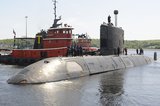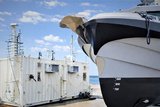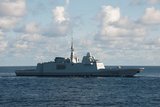RSN commissions two new LMVs
The Republic of Singapore Navy (RSN) has commissioned two new Littoral Mission Vessels (LMVs), RSS Sovereignty and RSS Unity, at Changi Naval Base, the Singapore Ministry of Defence announced on 14 November.
The LMVs will be used to safeguard Singapore's waters, protect its sea lines of communication and contribute to regional peace and security.
Jointly developed by the RSN and the Defence Science and Technology Agency, the network-centric Independence-class ships are equipped with advanced radars and sensors, as well as a 360 degree out-of-window view and improved systems to enhance situational awareness and accelerate decision-making.
The LMVs have lethal and non-lethal options to deliver calibrated responses to deter and defend against various threats. Their mission modularity enables the ships to be configured for a wide spectrum of operations.
Sovereignty and Unity are the second and third vessels in the eventual fleet of eight LMVs that will replace the ageing Fearless-class patrol vessels.
The first-of-class RSS Independence was commissioned in May 2017 and the remaining five LMVs are expected to be operational by 2020.
More from Naval Warfare
-
![Is the US Navy’s Golden Fleet initiative achievable?]()
Is the US Navy’s Golden Fleet initiative achievable?
The effort to provide the US Navy with Trump-class battleships might face financial, production and doctrinal obstacles.
-
![How will SAFE shape naval procurement for Canada and its highest-receiving members?]()
How will SAFE shape naval procurement for Canada and its highest-receiving members?
Canada’s inclusion on the EU’s Security Action for Europe initiative is set to enhance the country’s defence procurement strategy with important implications for some of its naval programmes, while Poland and Romania have also secured significant SAFE funding.
-
![Thales wins DE&S contract for portable autonomous command centres]()
Thales wins DE&S contract for portable autonomous command centres
The agreement to provide portable autonomous command centres to the UK Royal Navy will enhance the service’s Mine Counter Measure operations and further integrate autonomous and uncrewed systems into its fleet.
-
![Maritime defence in the Mediterranean faces challenges from vulnerable land power]()
Maritime defence in the Mediterranean faces challenges from vulnerable land power
As an indispensable energy crossroads, the Mediterranean is at serious risk from grey zone disruption. As navies increasingly employ AI data centres, what happens when cutting-edge defence technologies rely on the very infrastructure most susceptible to hybrid tactics?























